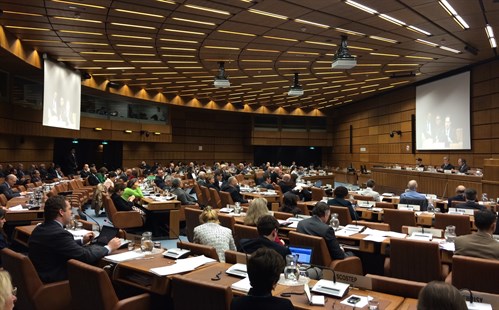SWF Actively Participates in the 51st Session of the Scientific and Technical Subcommittee of the UN Committee on the Peaceful Uses of Outer Space
Friday, February 14, 2014

The fifty-first session of the Scientific and Technical Subcommittee (STSC) of the United Nations Committee on the Peaceful Uses of Outer Space (UNCOPUOS) was held from February 10-21, 2014, at the United Nations Office in Vienna, Austria. Once again this year SWF had a strong participation in several areas.
This year's meeting marks the beginning of the discussions of the Working Group of Member States on the set of draft proposed guidelines for the long-term sustainability of space activities. The draft guidelines are a result of the work of the four Expert Groups convened by STSC in 2011. Multiple SWF team members took part in the Expert Groups.
On February 11, SWF Technical Advisor Brian Weeden delivered a statement on behalf of SWF commending the work of the Expert Groups and urging the Working Group to reach consensus on a set of voluntary guidelines in a timely manner. The statement also recommended that linkages between the work of UNCOPUOS on long-term sustainability of space activities and the report of the Group of Governmental Experts (GGE) on Transparency and Confidence-building Measures (TCBMs) for Space Activities should be a topic for future discussion by UNCOPUOS.
On February 12, Brian Weeden delivered a second statement under the Exchange of Views agenda item summarizing the activities of SWF since June 2013 relevant to the work of UNCOPUOS.
On February 13, Brian Weeden also gave a technical presentation on the non-technical challenges posed by rendezvous and proximity operations (RPO) and in particular on-orbit satellite servicing (OOS) and active debris removal (ADR). Mr. Weeden''s presentation highlighted the multiple events SWF participated in and co-organized on this subject in 2012 and 2013 and the recommendations from those events on ensuring future RPO, OOS, and ADR activities take place in a safe and responsible manner that enhances space sustainability.
SWF Senior Advisor Ray Williamson also attended the session to participate in the discussions of Action Team-14 (AT-14) on implementing its 2013 report on dealing with the threat posed by Near Earth Objects (NEOs). Specifically, AT-14 discussed the creation of an International Asteroid Warning Network (IAWN) and a Space Mission Planning Advisory Group (SMPAG) for detecting and warning about potential threatening asteroids and organizing international efforts to mitigate or deflect them. The Chair of AT-14 presented a report to STSC summarizing the efforts to implement the IAWN and SMPAG.
SWF Project Manager Chris Johnson also attended the session and met with UNOOSA and UN-SPIDER to discuss future projects and collaborations with SWF on using space technology for human and environmental security on Earth.

 Share
Share